Quick Jump: #Courses • #Books • #References
Python is a high-level programming language that works in various application domains. Released by Guido van Rossum in 1991, it is to this day one of the most popular programming languages to be ever used.
Python is most notably used to write scripts that can be used to streamline tedious tasks, such as scraping information from websites. Python is also popular in Web Development, Mobile Development, and in recent years, Machine Learning. There is little that Python cannot do, which makes it a superb choice for entry-level programmers.
It’s worth noting that the popularity of Python directly correlates with learning the language itself. Thanks to its popularity, access to in-depth resources and online support is easy to find. As a beginner, you will find that a lot of the problems you encounter have already been encountered by someone else. This lets you accelerate the pace at which you learn.
Last but not least, Python is easy to learn. It reads much like the English language itself, making it easy for novice developers to grasp certain language concepts faster. In fact, let’s illustrate that through a “Hello World” program.
Hello World in Python
# this is a comment
print("Hello, I am learning Python.")Hello World in C++
// this is a comment in C++
#include <iostream>
int main() {
std::cout << "Hi, World!";
return 0;
}As you can see from this example, despite Python being a high-level language – it is a lot less systematic in its syntax. This will become increasingly evident as you learn new things.
High-quality resources for learning Python
To ensure high quality, I’m going to follow 3 simple principles:
- Open Source to ensure everything on this page is free of charge.
- Community to ensure that resources listed here are endorsed by actual Python developers.
- Strictness to ensure that the narrative is strictly about learning.
This ensures that you have a direct path for learning. Over time, I’ll try and update this resource to cover more areas and learning materials.
How hard is it to learn Python?
You might be wondering, “Is Python hard to learn?” The straightforward answer is: it depends on you and your background. But don’t worry, I’ll break this down further.
Familiarity with Coding Concepts
If you’ve dabbled in programming languages like C, Java, or even web languages like HTML and JavaScript, you’ll find Python relatively easier. Python has less syntax clutter, making your code cleaner and easier to read. So, you’ll spend less time fixing tiny errors and more time understanding the logic.
Objective Matters
Why do you want to learn Python? Is it for data analysis, web development, or artificial intelligence? The difficulty level varies depending on your end goal. For example, using Python for simple automation tasks might require less effort compared to building machine learning models.
Quality of Learning Resources
There’s an abundance of tutorials, books, and courses on Python, both free and paid. But it’s the quality that counts. You’ll find some courses go too fast, while others might not cover enough ground. So, you’ll need to sift through resources and possibly combine multiple sources for a comprehensive understanding.
Time Commitment
Learning a programming language is like learning a new instrument. You can’t expect to become a maestro overnight. With consistent practice and hands-on experience, you can become proficient. But remember, everyone’s pace of learning is different.
Python Community
One often overlooked factor is the Python community. It’s robust, inclusive, and super helpful. You’ll find a wealth of open-source libraries and frameworks, as well as forums to get your questions answered.
So, to sum it up, Python is as hard or as easy as you make it. Your prior coding experience, the quality of your learning resources, and the time you can devote all play a role. Regardless of these factors, the strong community support can give you an extra push when you’re feeling stuck.
💻 Courses
An online course is the closest equivalent to sitting in an actual class. My selection of Python courses covers a wide range of approaches. Above all, to take full advantage of any course – you must be willing to do the work. Programming is a lot about repetition, so following along with the course material is crucial. Even if it feels like you’re taking baby steps.
Python Basics with Sam
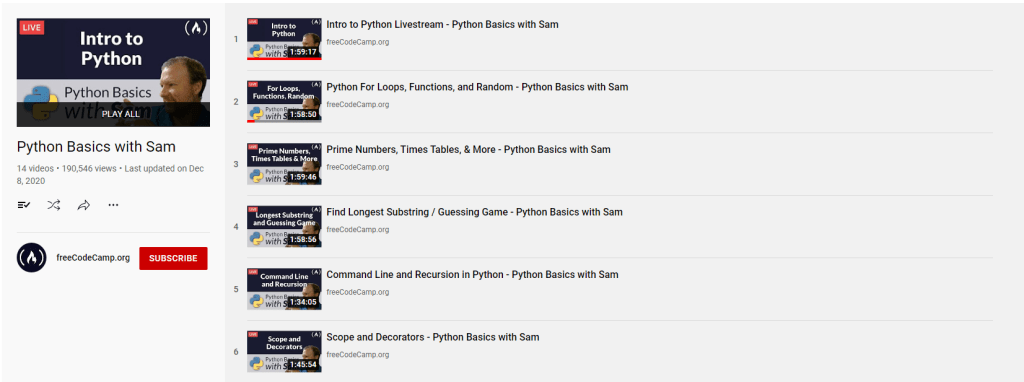
The problem with many YouTube courses is that the entire “course” is crammed into a 4-hour video. This is not one of them. Python Basics with Sam – endorsed by freeCodeCamp – has 20 hours of course material divided into 14 videos. Enrolling in this free course means you will have to pace yourself. The intro video alone is 2 hours long. But it does a great job at introducing Python to beginners while laying out the roadmap for the entire course.
futurecoder – Learn Python from scratch
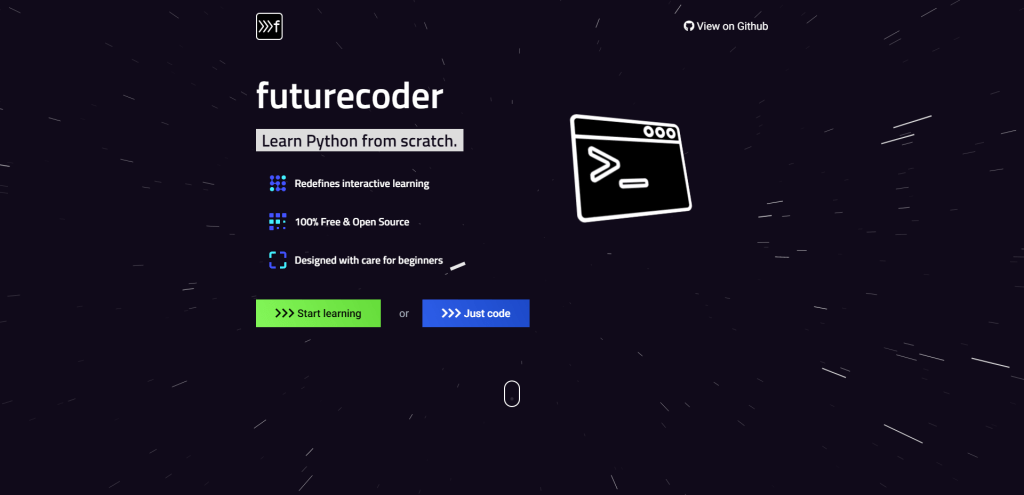
Codecademy revolutionized the process of learning to code inside the browser. Since then, many more have followed in their footsteps. Futurecoder – a project by Alex Hall – is an open-source interactive Python course that you can work with entirely in the browser. It starts with some basic concepts but provides in-depth explanations so you’re not lost in the water. It is as beginner-friendly as it is comprehensive.
Python for Absolute Beginners
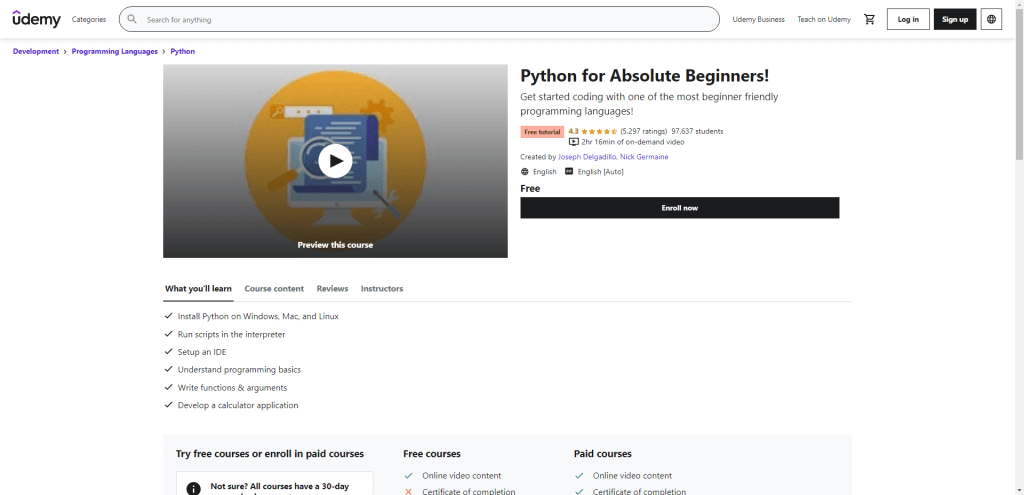
This free Udemy course from Joseph Delgadillo and Nick Germaine has been enrolled by more than 90,000 students. It’s one of the go-to free online courses to get started with Python. You will learn about installing Python, running basic scripts, and working on a specific project based on the contents of the course. The only requirement is that you have to sign up for an Udemy account. I think that’s a small price to pay.
Learn Python Programming
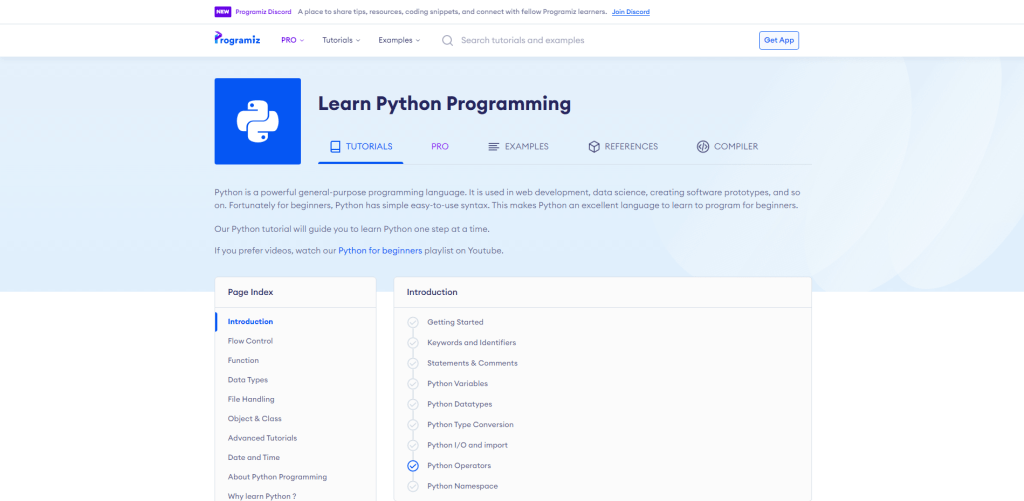
This free online course from the folks at Programiz is an absolute treat. It is divided into 36 individual chapters, each covering a specific topic in the Python programming language. The course includes almost 100 unique examples while providing easy access to Python references. You can study each individual lesson on their website, which is complemented with a specific YouTube video for each lesson.
Introduction to Python Programming
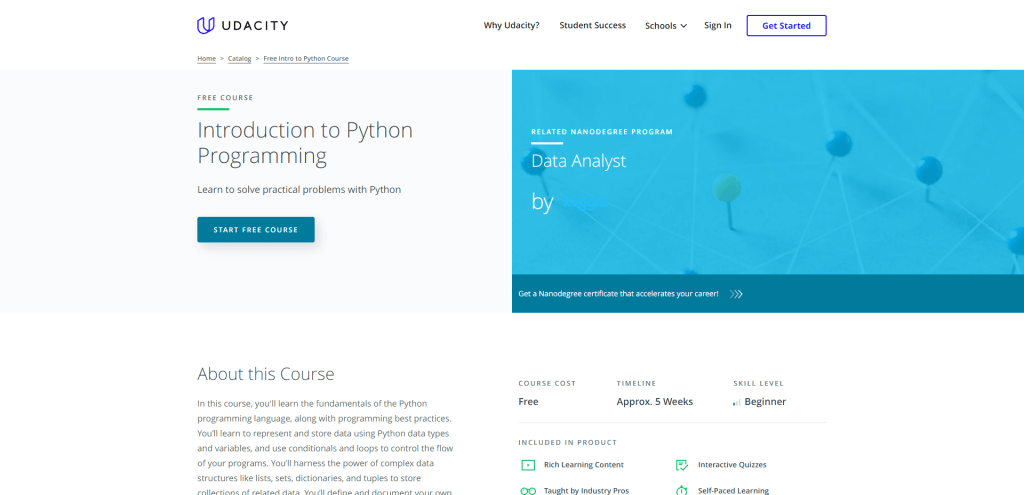
This Udacity course, which lasts about 5 weeks, will take you through the fundamentals of Python. You’ll learn how to write good Python code, alongside gaining a deep understanding of how to manipulate data for your needs. Notably, this course covers the topic of using libraries and how they can be used to build functional applications quickly. In other words, why reinvent the wheel if you can just choose a pre-built starting point?
📘 Books
A book is like documentation, though greatly extended. Books are also great to keep nearby because they contain timeless references. If you want to grasp technical concepts truly and their application in real-world scenarios, having at least one book is a must.
Learn Python the Right Way
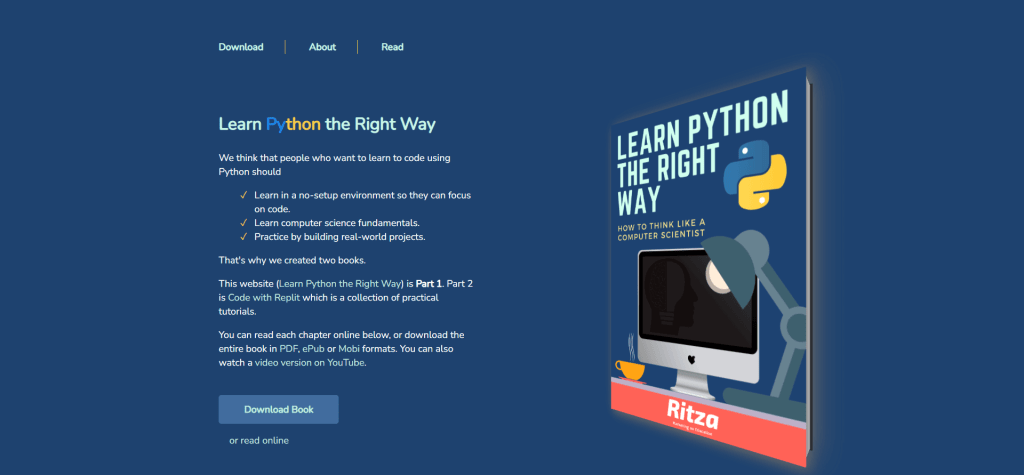
Learn Python the Right Way is one of the best books on grasping the fundamentals of Python. It doesn’t just teach you the syntax but also explains why that syntax matters. The book quickly progresses to introduce illustrated examples and lets you build interactive programs. Last but not least, you will have a lot of homework to do as the book covers various exercises. The emphasis is on critical thinking and practice over linear learning.
Think Python: How to Think Like a Computer Scientist
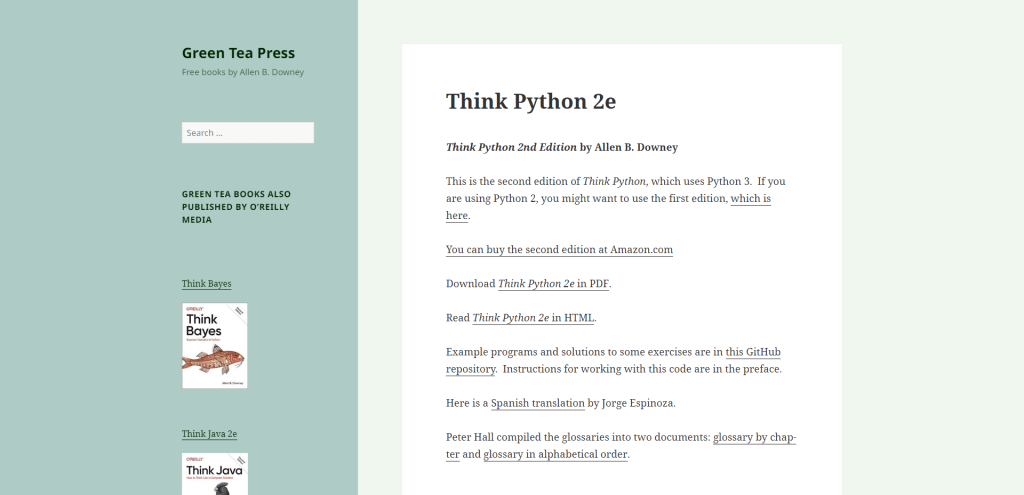
In this book, Think Python, you will learn about the Python language through the lens of a computer scientist. The book follows a simple guideline of introducing a concept and then applying that concept by coding a real program. More complex topics are slowly introduced over several chapters. Which then culminate into larger parts where you must put your newly acquired knowledge to the test.
Python 101
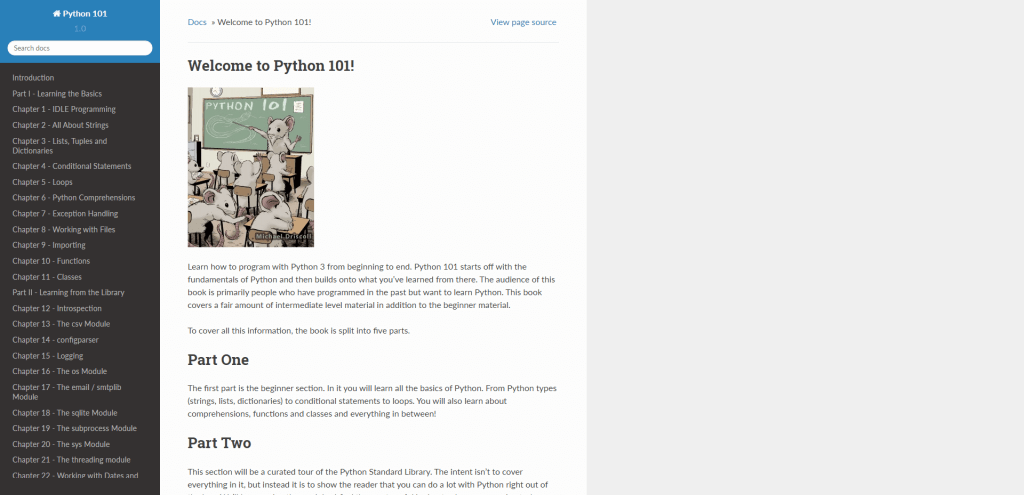
Mike Driscoll, the author of Python 101, has a strong foothold in the Python community. He has authored several books, has a YouTube channel where he posts Python videos, and has written numerous tutorials on the topic. This book lays out more than 40 chapters of a deep dive into the language. But most importantly, it is packed to the brim with examples and code challenges. Which is, of course, the best way of cementing all the new things you have learned.
Learn Python Programming – Second Edition
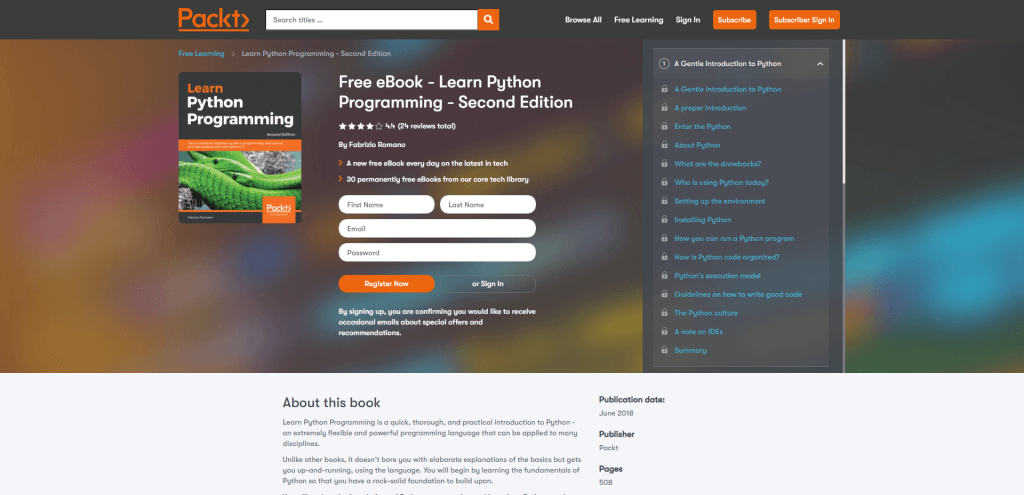
Fabrizio Romano, the author of this book, has worked in software development since the late 90s. And his free book goes into extensive and practical explanations of the Python language. The book starts out with an introduction to the fundamentals of Python. This way, when the book starts to present more challenging topics – you already have some knowledge of how the language works. If you want to build websites with Python, by the end of this book – you will know exactly how to do it.
The Coder’s Apprentice
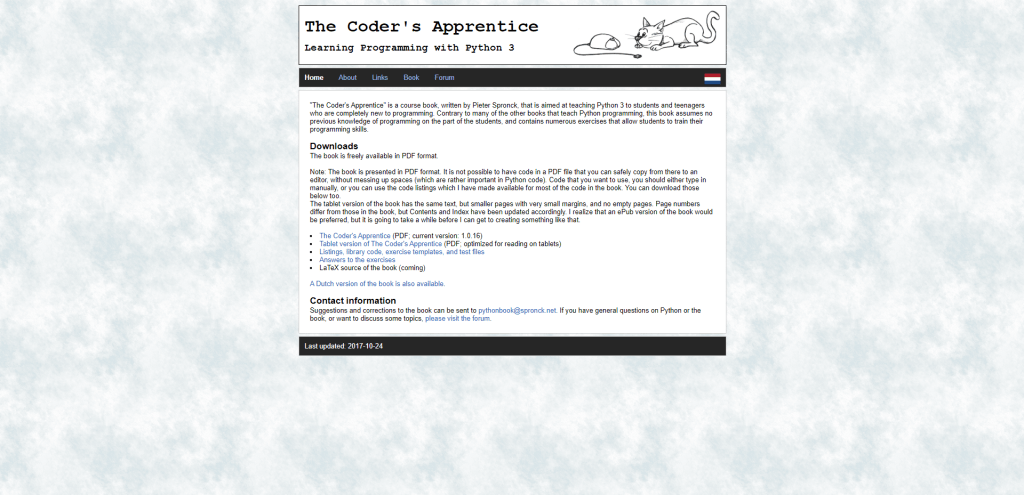
This book, The Coder’s Apprentice, authored by Pieter Spronck, assumes that you’ve never written a program before. As such, it is the perfect book to start understanding the concept of writing code. In the book, you will find plenty of exercises and in-depth explanations of complex topics. Mind you; the book has 400 pages of detailed writeups on how to write functional Python code. It is an absolute must-have.
📄 References
A reference is a page where you can go to get instant answers to the most common questions. It can be documentation, but it can also be a unique reference specializing in a specific topic. E.g. The reference to the most popular components used in developing web applications with Python. Some of these should be on your bookmarks list.
Python Documentation
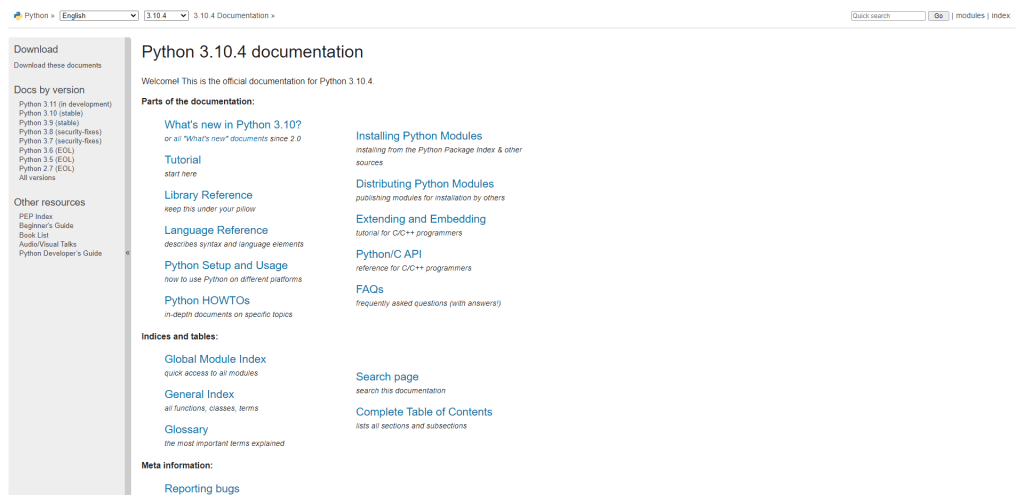
This is arguably the most important reference point for learning Python. The official documentation is not influenced by personal opinions or otherwise. It simply outlines the very core of how Python works as a language. The documentation covers the entire Python syntax and provides quick access to tips and explanations.
Stack Overflow
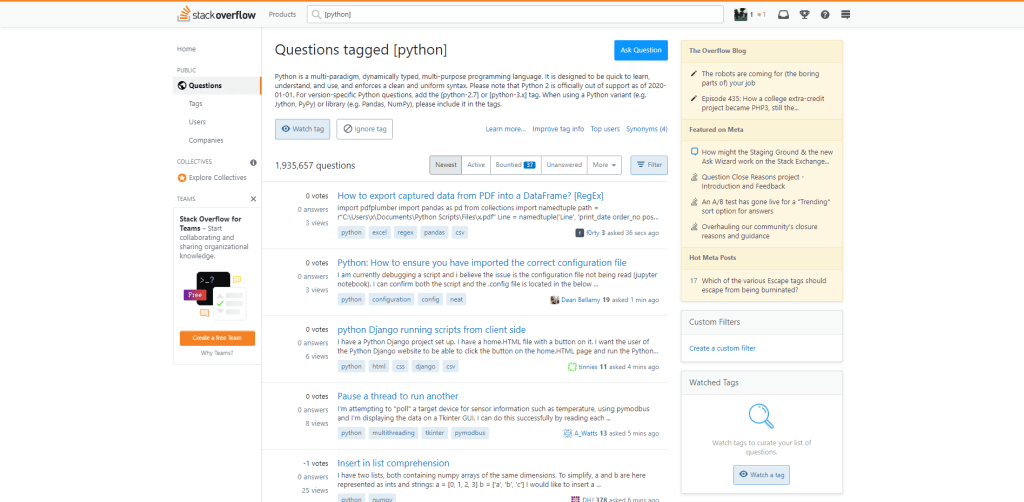
If you have a question about a specific Python problem, there is a high chance that it has already been answered on Stack Overflow. It is the most popular platform in the world for finding answers to programming-related queries. What makes Stack Overflow great is that is a reputation-based platform. As such, you are more likely to find correct answers because the community can peer review each one.
Learn Python @ Reddit
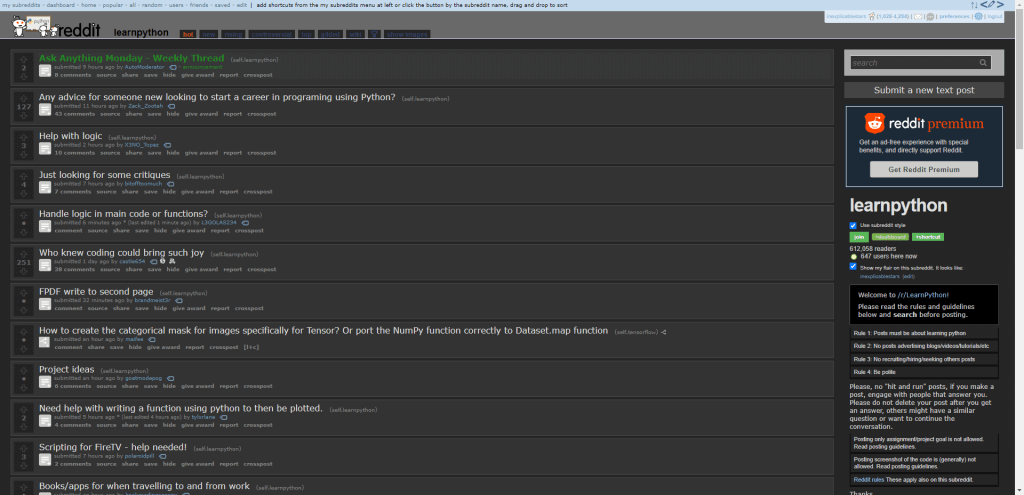
The Reddit community for Learn Python has 600,000+ active members. It’s one of the most visited communities for anyone dipping their toes into the Python universe. Not only will you find plenty of resources here, but also have the ability to ask specific questions. If you’re looking for like-minded people to learn together with, this is the place to be.
Conclusion
By now, you’ve gotten a good look at an array of resources to kickstart your Python learning journey. From structured courses like “Python Basics with Sam” to insightful books like “Think Python: How to Think Like a Computer Scientist,” there’s something for everyone. It’s more than just a list; it’s a tailored guide aimed at giving you multiple pathways to master Python. Don’t hesitate to cross-reference between different types of resources. For example, using a book for theory and a course for hands-on exercises can offer a well-rounded learning experience.
So, where does that leave you? Remember, the challenge of learning Python isn’t insurmountable; it’s all about your approach. Everyone has their own pace and learning style, so take your time and don’t rush the process. If you ever get stuck, you’ve got the Python community as a safety net, from the official Python Documentation to lively discussions on Reddit. Ultimately, the goal is to learn by doing. So, roll up your sleeves and start coding—you’ll learn more from your mistakes than you might think!
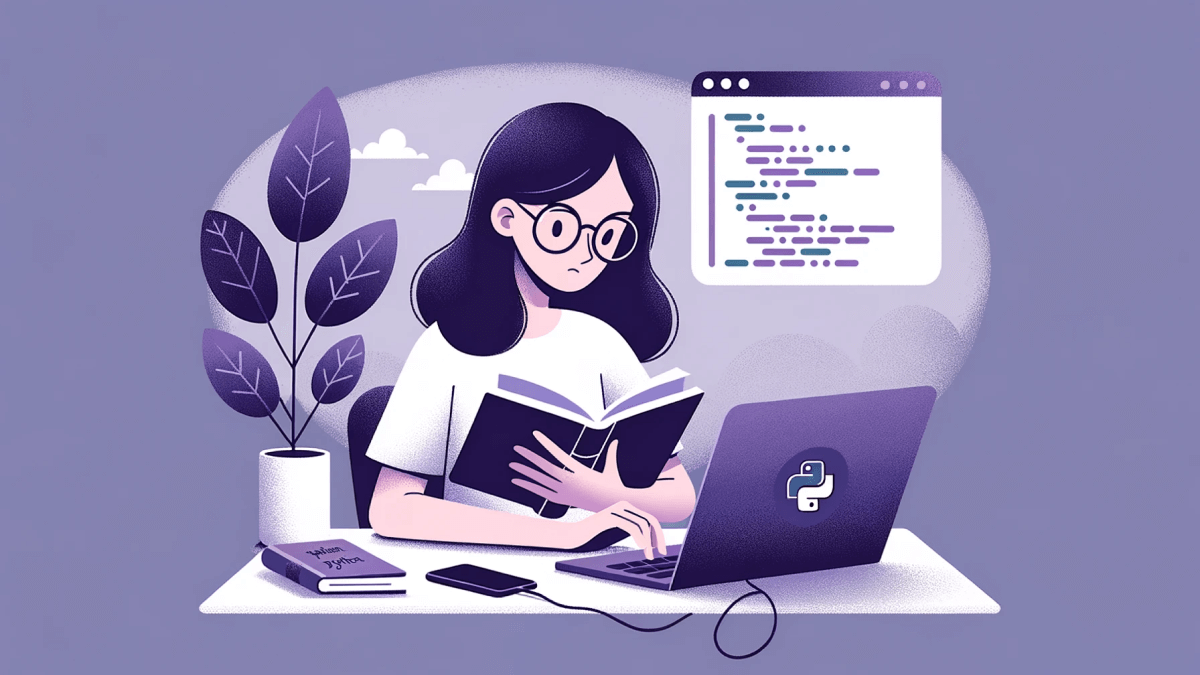
No comments yet